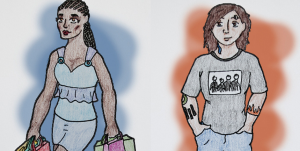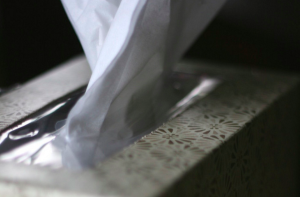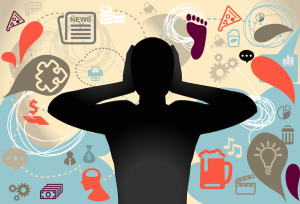Panel 1
(Jo greets Shawna; Jo is standing and Shawna is seated in a wheelchair.)
Jo: Hey Shawna, what’s wrong?
Shawna: I’m confused, Jo! We’re learning about periods in school but what I hear in class is different from what my mom tells me and nothing at all like the pamphlet they handed out at church. I keep getting all this conflicting information and I just wish there was someone we could talk to and finally get the facts straight!
Panel 2
(A cartoon Uterus pops into existence while Shawna and Jo face it, smiling.)
Uterus: Just ask me! I’m a uterus and I know all about menstruation! So, what do you want to know?
Shawna: Well, first of all, what is really happening in our bodies when we menstruate?
Panel 3
(A diagram of a uterus showing uterus, ovaries, fallopian tubes, cervix, vagina, and endometrial lining. The cartoon Uterus hovers next to the diagram and speaks.)
Uterus: Menstruation (frequently called a period or menstrual cycle) occurs when a uterus sheds its endometrial lining, which typically occurs every twenty-eight days, though cycle length can vary tremendously from person to person or even in one individual.
Panel 4
Jo: You say “from person to person,” but my mom says only women menstruate, is that true?
Uterus: No, Jo, your mom is wrong.
(Three male or non-binary presenting people face the reader, the Uterus hovers at the bottom left and speaks.)
Uterus: Transmen, non-binary, genderqueer, and intersex folk can also menstruate. By insisting or suggesting that menstruation is exclusive to women you’re erasing the existence and experience of non-women who menstruate.
Panel 5
Shawna: Does that mean that all women menstruate?
Uterus: No, not all women menstruate.
(A group of four women face the reader, the uterus hovers at the bottom right of the panel and speaks.)
Text: There are lots of reasons that women might not menstruate: some may not have uteruses, some may use birth control that stops menstruation, some may be post-menopausal, menstruation may have stopped for some as the result of an eating disorder, chronic condition, hormonal imbalance, or any one of a hundred other reasons. But women who don’t menstruate are most assuredly women, and they are most assuredly not broken. Attempting to define women as “all people who menstruate” is ridiculous – it excludes a lot of women, misgenders a whole bunch of people, and sets up a false dichotomy. Women are defined by themselves, not by their body functions.
Panel 6
Jo: My auntie says menstruation means I’m growing up – does that mean that I don’t get to be a kid anymore?
Uterus: Nope! You can still be a kid once you’ve started menstruating!
(A young child and a tween stand next to one another, the uterus hovers between them and speaks.)
Text: The average age of menarche (first menstruation and ovulation) in North America is between eight and thirteen years old. A thirteen-year-old is still a child regardless of sexual maturity, and anyone who tries to impose adult responsibilities, attitudes, and motives on a child is wrong. You don’t have to be a grownup just because you’ve started puberty.
Panel 7
Shawna: My coach told me that menstruation is no big deal and we should just play through it – is he right?
Uterus: Well, that depends…
(One woman who looks very happy and is finishing a race, another woman who is upset-looking and has stars to indicate pain radiating from her abdomen. The uterus is at the bottom right of the image and speaking.)
Text: Menstruation can cause cramps, diarrhea, migraines, nausea, vomiting, low iron levels, back pain, irritation, and exhaustion. Some people have very few of these symptoms or have them only mildly while other people have a lot of the symptoms or feel them very strongly. Difficult menstruation can also affect the same person differently at different times in their life, so if someone says their period is a big deal, or painful, or problematic then it IS those things and you need to respect that person’s experience.
Panel 8
Jo: My sister told me that PMS makes people irrational – does that happen?
Uterus: Not at all.
(Several people with expressions indicating happiness, anger, sadness, exhaustion, and a neutral expression. The uterus hovers in the bottom right.)
Text: Menstruation occurs concurrent to hormonal fluctuations. Changes in hormone levels can make people feel emotions more acutely or intensely, but emotion and rationality aren’t mutually exclusive. Hormonal fluctuations can be exasperating and can have an effect on temper and mood, but everyone reacts to hormones differently and throwing out blanket statements about irrationality is not only factually incorrect, it’s also insulting.
Panel 9
Shawna: My uncle told me not to use tampons because they’ll take my virginity – is that something I have to worry about?
Uterus: No way!
(A stereotypical statue depicting purity with a red “X” over it next to a tampon. The uterus hovers at the bottom left of the image and gestures with one ovary-hand.)
Text: Virginity is a harmful construct that reduces a person’s worth to the condition of a single body part – nothing about a wad of cotton can devalue the youness of you. That being said, there are plenty of people who are uncomfortable with penetration and people should never be judged for how they choose to manage their menstruation. If you’re not comfortable with tampons that’s fine – if you are comfortable with tampons that’s fine too!
Panel 10
Jo: The health teacher told us we can treat cramps by eating bland food – that can’t be right…
Uterus: No, what you eat won’t help your cramps.
(Two illustrations of uteruses, one of which is relaxed and another which is contracting with yellow arrows to show contraction and flow. The cartoon uterus is between them, speaking.)
Text: A lot of people believe some pretty wacky stuff about what causes cramps – I’ve heard everything from eating too much sour food to the ovum forming a blister on the ovary during ovulation listed as a possible cause for cramps. But here’s what really happens: Cramps are caused by a uterus contracting in order to shed and expel the endometrial lining. That’s all. They’re not caused by cold food, spicy food, cold feet, hot water, washing your hair, or exercise. You can lessen cramps by using NSAIDs (non-steroidal anti-inflammatory drugs), taking a hot bath or using a heating pad, having an orgasm, or exercising.
Panel 11
Jo: My grandma says if you use tampons you’ll get toxic shock syndrome and die – are tampons going to make us sick?
Uterus: That is very unlikely.
(Images of various absorbencies of tampons, a menstrual cup, and a pad. The cartoon uterus hovers at the bottom left.)
Text: Toxic Shock Syndrome (TSS) is caused by a bacterial infection that sometimes results from wearing higher-absorbency tampons than necessary or wearing a tampon for too long. The symptoms are vomiting, diarrhea, headache, fever, and chills. But if you follow manufacturer instructions for tampon use you should be safe. Menstrual cups have a lower risk of TSS than tampons, and pads have no risk at all, but only two out of every one hundred thousand tampon users get TSS, so the overall risk with proper use of tampons is VERY low. But if you do think you’ve got TSS please seek medical attention immediately.
Panel 12
Jo: The boys in our class say you can’t have sex while you’re menstruating, are they right?
Uterus: There is no reason not to have sex while you are menstruating so long as everyone can and does consent.
(A collage that includes a rabbit-style vibrator, a vibrating egg, and a latex glove, condoms and a couple holding hands and smiling at one another. The uterus hovers by the couples’ feet.)
Text: There is absolutely no reason to avoid sex or masturbation while menstruating unless it makes you uncomfortable. Some people produce less natural lubricant while they are menstruating but a water- or silicone-based lubricant can solve that problem. If you’re worried about contact with blood, barrier methods (like condoms, dental dams, and gloves) are safe to use while menstruating.
Panel 13
Shawna: I heard my sister say you can’t get pregnant while you’re menstruating – is that right?
Uterus: You absolutely CAN get pregnant while menstruating.
(A bemused-looking pregnant woman and images of birth control methods [condoms, birth control pills, an IUD, an implant, and a hormone release ring].)
Text: Everyone’s menstrual cycle is different – sometimes bleeding can continue until only a couple of days before ovulation. Sperm can live for three to five days, so having unprotected sex while menstruating can lead to pregnancy. To prevent pregnancy while menstruating, make sure to use some form of birth control.
Panel 14
Shawna: I’ve heard this from a lot of people, so I have to ask: is menstruation dirty?
Uterus: Not at all.
(Four happy-looking people who menstruate smiling and hugging one another, the cartoon uterus is speaking and hovering in the center of the group. The uterus pops up periodically through the text as well.)
Text: Menstrual blood is just blood and a little bit of tissue. It carries the same pathogens as blood does and nothing else. It isn’t unclean any more than a cut on a finger would be unclean. The same precautions apply to handling menstrual blood that would apply to handling any body fluid. If you’ve been cleared of any blood-borne pathogens it is safe for you and your partner(s) to have contact with your menstrual blood, and if you do have blood-borne infections barrier methods (condoms, dental dams, and gloves) will prevent the spread of infection.
Many people are taught by their culture that menstruation pollutes them, a lot people are misinformed by their educational systems about how clean and awesome uteruses can be, and some people say that menstruation is dirty just to try to make people who menstruate seem weak or unimportant (because some people are jerks). But menstruation is totally natural and people who are menstruating are not dirty, polluted, contaminated, or dangerous; to imply otherwise is much grosser than menstruation could ever be. How you feel about menstruation, whether you are fascinated by the process and it makes you feel in tune with yourself or whether you find it uninteresting and just wish it was over, is completely up to you: it’s your body and you’re the only one who gets to dictate your relationship to your body.























